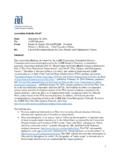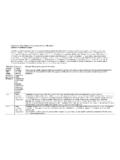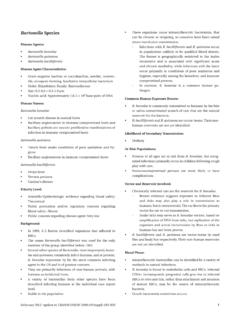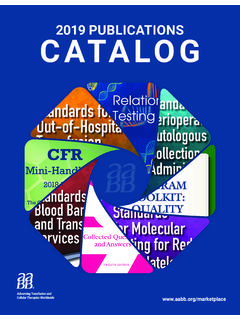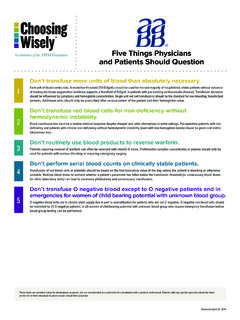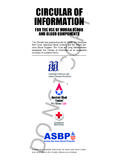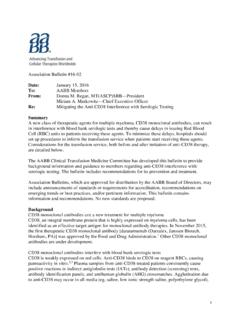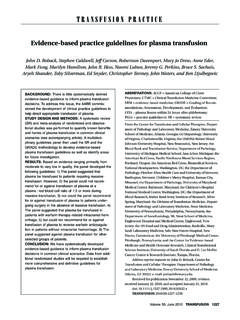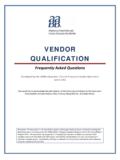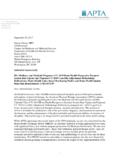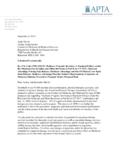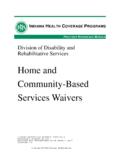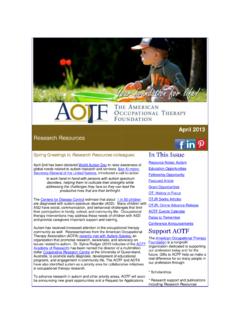Transcription of Joint Comments to CMS on “Request for …
1 March 12, 2018 Seema Verma, MPH, Administrator Centers for medicare & Medicaid Services Department of Health and Human Services Attention: CMS 1678 FC Mail Stop C4 26 05 7500 Security Boulevard Baltimore, MD 21244 1850 Re: request for Information: Revisions to Personnel Regulations, Proficiency Testing Referral, Histocompatibility Regulations and Fee Regulations under the Clinical Laboratory Improvement Amendments of 1988 (CLIA); CMS-3326-NC Dear Administrator Verma: On behalf of the undersigned member associations of the American Society for Clinical Pathology (ASCP) Board of Certification (BOC) Board of Governors (BOG), we are writing to provide comment on the Centers for medicare & Medicaid Services (CMS) recent request for Information (RFI) on revisions to the Clinical Laboratory Improvement Amendments of 1988 (CLIA) personnel regulations. These Comments are generally focused on the RFI s policy proposals specific to laboratory testing personnel regulations.
2 The ASCP BOC BOG is composed of representatives from our partner laboratory professional organizations and serves as the governing body to the ASCP Board of Certification (BOC). The ASCP BOC s mission is to provide excellence in certification of laboratory professionals on behalf of patients worldwide. We are considered the gold standard certification for medical laboratory professionals around the world. The ASCP Board of Registry (BOR) began in 1928. In 2009, the BOC was formed by the merger of the ASCP BOR and the National Credentialing Agency. We are an independent, non-profit certification agency that develops appropriate standards and procedures to assure the competence of medical laboratory personnel and have certified over 500,000 laboratory professionals in the United States and internationally. We are the only ANSI accredited certifying body of laboratory professionals in the United States and have one of the largest accredited certification programs (21 certifications) in the country.
3 Our credentials are recognized for licensure in all US licensure states and we are the sole provider of licensure exams in the state of New York. We are opposed to the Agency s flawed and erroneous policies and proposals recognizing nursing degrees as equivalent to biological science degrees, as well as, allowing holders of nursing degrees to perform and supervise non-waived laboratory testing. The Agency s equivalency position and proposal to allow nursing degrees to be separately qualifiable for purposes of performing high complexity testing or serving as a technical consultant significantly lower the qualifications necessary to perform non-waived testing and could have serious repercussions for test quality and patient safety. We firmly believe that only those individuals who have completed bachelor s degrees and sufficient coursework in the biological, chemical and clinical laboratory sciences should be considered to have satisfied the bachelor s degree requirement necessary to perform high complexity testing or serve in supervisory roles within non-waived laboratories.
4 Given that we presented to CMS in September 2016 a petition signed by 35,000 individuals concerned about CMS The Honorable Seema Verma March 12, 2018 Page 2 2 April 1, 2016 equivalency position, we believe our Comments on the inappropriateness of the nursing degree to non-waived testing are reflective of the views of laboratory professionals across the United States. I. Personnel Requirements The following section outlines our views and positions on the CLIA regulation s personnel requirements, including those outlined in the CMS RFI. This discussion covers the issue of the nursing degree as sufficient to meet the CLIA high complexity degree requirements for purposes of performing high complexity testing and serving as technical consultants of a moderate complexity laboratory, as well as the physical science degree and non-traditional degrees. A. Nursing Degrees In the RFI, CMS notes that it currently considers a bachelor's degree in nursing to be equivalent to a bachelor's degree in biological science for purposes of the educational requirements for moderate and high complexity testing personnel under CLIA.
5 Further the Agency states that it is: considering drafting proposals to amend 42 CFR (moderate complexity technical consultant), (moderate complexity testing personnel), and (high complexity testing personnel) to expressly reflect that policy. [CMS is] also considering whether a nursing degree should be considered as a separate qualifying degree, as opposed to the equivalent of a biological science degree, for purposes of meeting the educational requirements for moderate and high complexity testing personnel and technical consultants. As such, we are also considering proposing to amend , , and to add a nursing degree as a separate qualifying degree to the current list of qualifying degrees for the moderate and high complexity testing personnel and technical consultants. CMS states in the RFI that it is seeking public Comments as to whether a nursing degree is equivalent to a biological science degree; or (2) whether it should add nursing degrees as a separate qualifying degree (as opposed to the equivalent of a biological science degree) to the current list of qualifying degrees.
6 Our response is that (1) nursing is NOT equivalent to a biological sciences degree; and (2) CMS should NOT add nursing as a separately qualifying degree allowing its holders to perform high complexity testing or supervise non-waived testing. 1. Evidence that a Nursing Degree is not Equivalent to a Biological Sciences Degree We have great respect for the nursing profession and fully believe that nursing degrees, both at the associate and baccalaureate degree level, offer individuals outstanding training pertinent to the practice of nursing. Nurses fulfill essential functions in point-of-care testing, the vast majority of which is CLIA waived. But the fundamental reality is that the nursing degree is not intended to be, nor should it be viewed as, equivalent to a biological science degree or any other science degree earned by laboratory testing professionals who perform, supervise, or direct moderate and high complexity diagnostic testing services.
7 Similarly, nursing degrees should not be recognized separately as they do not provide adequate instruction to enable its holder to perform high The Honorable Seema Verma March 12, 2018 Page 3 3 complexity testing or to supervise non-waived laboratory procedures. It should be viewed for what it is, a health services degree focused on the practice of nursing not laboratory medicine or histology. The proposition that a nursing degree is equivalent to a degree in the biological sciences is erroneous and inconsistent with the CLIA regulations. Biological sciences degrees vastly outweigh nursing degrees both in terms of their course load and rigor. In Appendix 1, we provide an overview of the academic science course requirements for nursing and biological sciences bachelor s degree programs. The comparison of biology and nursing degree requirements in the table in Appendix 1 shows that at least 32 hours of 200 level or higher coursework in chemistry or biology combined is required for biology, but not for nursing.
8 For nursing programs science course are limited and introductory (100 level). They are not equivalent of those required for a science degree, and thus are not intended to be equivalent. As a specific example, the course catalog for the Nursing program at Case Western Reserve University gives the following description of Biology 114. Principles of Biology: A one-semester course in biology designed for the non-major. A primary objective of this course is to demonstrate how biological principles impact an individual's daily life. BIOL 114 introduces students to the molecules of life, cell structure and function, respiration and photosynthesis, molecular genetics, heredity and human genetics, evolution, diversity of life, and ecology. Minimal background is required; however, some exposure to biology and chemistry at the high school level is helpful. This course is not open to students with credit for BIOL 214 or BIOL 250.
9 This course does not count toward any Biology degree (emphasis added). One of the other misconceptions inherent in CMS erroneous policy that nursing is equivalent to the biological sciences is the presumption that nursing degrees provide similar lab time as biological sciences degrees. Considering the differences in course credits and rigor, clearly this is not the case. Furthermore, nursing programs do not address the laboratory competencies in 42 CFR ,1 particularly at the level of high complexity testing. This is an issue because CLIA appears to assume that individuals with a bachelor s degree in a chemical, physical, biological, or clinical laboratory science, or medical technology have sufficient hands-on laboratory experience to perform high complexity testing, and with sufficient experience, to supervise non-waived testing. This may help explain why the CLIA regulations have no specific training requirement for individuals qualifying on the basis of these bachelor s degrees [See 42 CFR (b)(1)].
10 While this presumption of appropriate training is clearly true for clinical laboratory science, medical laboratory science and medical technology degrees, it is not always the case for chemical, physical, and biological sciences degrees and it is certainly not true for nursing degrees. Training, however, is essential to ensure a thorough understanding of the quality assurance and quality control practices necessary to produce accurate laboratory test results and ensure quality patient care. Equating nursing to the biological science would seem to suggest that all of these degree holders have received sufficient laboratory expertise to perform and/or supervise high complexity testing, which is not the case. 1 The Code of Federal Registry ( ; Test Categorization) defines the skills needed to conduct moderate and high complexity tests. The following (abbreviated) criteria abstracted from CFR , applied to pre-analytic, analytic and post-analytic phases of testing are evaluated and graded by the FDA to place a test within moderate and high complexity categories: specialized scientific and technical knowledge; training and experience; operational skills such as monitoring, measurement, pipetting and calculation; assessment of specimens and calibration and quality control materials; trouble-shooting and decision-making skills related to test performance and equipment maintenance; independent interpretation and judgment.

